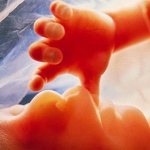As a pro-life activist I have often been required to attend some pretty depressing places. One particular occasion which rates very high on the depress-o-meter was a pro-euthanasia rally held on the steps of Victorian Parliament a couple of years ago.
Assembled on that sunny weekday morning were a group of 25 or so elderly folk holding homemade placards and leaning on various makes of walking sticks and Zimmer frames. Demographically speaking it actually looked remarkably like many ad-hoc weekday pro-life protests I had attended.
The only superficial difference between a Monday morning pro-life protest group and the euthanasia one I attended that day are the expressions on the activists’ faces. The euthanasia crowd that morning were not happy citizens and each of them wore a frown as if it were part of the uniform. Whereas pro-life veterans gathering for a media photo-op happily talk about their grandchildren, the football and the weather, this euthanasia crowd was very quiet and did not interact with one another.
When the cameras and newspaper journalists finally arrived the Death with Dignity spokesman rattled off some arguments about ‘right to autonomy’ and ‘dying in peace’. To me it sounded like lonely people demanding the ‘right’ to a lonely death. After he had finished I walked over to the media representatives and handed them a press release from the pro-life side.
“Look guys, it’s one of those religious zealots,” shouted one of the men from the protest group during my interview with The Age newspaper. “Get lost, this is our event… stop gatecrashing.”
The primary objection to my singular pro-life presence at the rally was the fact I might be religiously opposed to euthanasia. This was ironic seeing as one of the pro-euthanasia protestors (the youngest) was an impeccably dressed Anglican pastor, proudly wearing a clerical collar.
I wanted to talk to a couple of the protestors and engage them on this issue of euthanasia itself. So I approached the man who had most loudly objected to my being there. Pretty soon I was hemmed in on every side by a couple of dozen elderly euthanasia advocates, some in wheelchairs and another even had a mobile oxygen tank (it wasn’t exactly a physically intimidating mob).
“I must admit it is pretty sad to see you all here agitating for the right to commit suicide.”
“Why don’t you just leave? We don’t want to hear Catholic dogma!” There it was; religion again.
We then had a very civil group discussion about pain management, palliative care, family support and grief. So long as neither God nor Catholicism was mentioned my new friends seemed quite happy to talk to this ‘religious zealot’. I’ve often thought that many of the people who are first to line up for euthanasia actually just want to talk to anybody about anything (except Catholic dogma of course).
One of the frail souls who sidled up next to me had an interesting placard: ‘WHY CAN’T YOU JUST LET ME DIE LIKE A DOG?’ I assumed it was addressed to the Parliamentarians. Apparently this is one of the bumper-sticker slogans of the dying with ‘dignity’ crowd (notorious New Zealand euthanasia champion Lesley Martin, who was found guilty and jailed for matricide, wrote a book entitled To Die Like a Dog). It is a reference to the fact that veterinarians regularly euthanise beloved pets but doctors are prevented by law from euthanising human beings.
This was the most depressing aspect of the death lobby’s groupthink: animals and humans should be treated as equals. Whereas I saw euthanasia as a degradation of the human person these sad people jealously saw euthanasia as a right unfairly only enjoyed by pets. It explains why the Greens Party are the most persistent political advocates for euthanasia because their whole philosophy is geared towards exaltation of animals and nature over human beings. (To borrow a line from George Orwell, ‘four legs good, two legs bad’).
I told the person holding the placard, “You certainly do not want Philip Nitschke to be the one who lets you die like a dog.” The protestor looked confused, as if to say ‘that’s exactly what I would like’. I reassured him sternly, “No. Seriously, you don’t want Nitschke to treat you like a dog.”
I was alluding to a then recent (now widely forgotten) TV interview with Australia’s pre-eminent Dr Death, Philip Nitschke. In a November 2007 televised chat with Andrew Denton on his show Enough Rope, Nitschke confessed to brutally murdering his landlord’s dog when he was a 15 year-old boy in Adelaide. Here is Nitschke in his own words:
“I was put 200 kilometres away from my home in the country down into, uh, to continue with my high school training in Adelaide. Stuck there, miles away in a situation where I was finding myself, you know, getting felt up by the landlord on a fairly regular basis and in a pretty unsatisfactory situation. It got so grim there you think you know you feel like killing the people involved and you know can’t do that and you end up killing the dog. So I killed the dog, um…and I didn’t set out to kill it in a, such a grim way. I mean I set out to kill the dog, and it turned out that dog wasn’t easy to kill so I ended up cutting its throat and killed it. And then made my made my escape and I got taken out of that situation. I guess, looking back at it now, it’s a sort of a… it’s a bizarre way to get yourself out of a set of intolerable personal circumstances, but I also don’t try and be too hard on myself. I mean plenty of other people will be, but at the time when you think back about it, when you’re 15, you do a lot of stupid things. And I think it was just really bizarre piece of behaviour and something that I am very embarrassed about, but it happened in that context and thank God I killed the dog and not the landlord.”
Talk about Enough Rope! It was like Nitschke committed PR suicide by hanging himself on live television! Teenager Nitschke, one day to become Australia’s most vociferous euthanasia spokesman, became so infuriated with a barking dog he first tried to strangle it with some cord and, failing that, he decided to slit its throat with a knife. That was his first kill. It came at a time when he alleges that he was ‘felt up’ by the landlord.
When the FBI or other investigative organisations are profiling a serial killer who is still at-large two indications they look for in suspects are cruelty to animals and being a childhood victim of sexual assault. The pathology of Nitschke, and his obsession with death, is put into a compelling context when one keeps this ‘killing a child molester’s dog with a knife’ adolescent episode in mind.
So that gentleman’s placard at the Parliamentary euthanasia protest about dying like a dog was especially ironic. After I had the chance to retell the Nirschke-dog murder story the objections to my holding court amongst this gaggle of now tired looking activists returned to familiar territory: ‘yeah, yeah… but admit it sonny, you only oppose euthanasia because you think God talks to you.’ The man had put his placard down and was now lightly poking my chest with his bony finger.
“It is true that I have a religious objection to euthanasia. I am a Catholic. However, your support for euthanasia is based upon a fervent religious belief too. You are a devout atheist I take it?”
“Hmmm,” the old man grumbled, “I was a Catholic once. I’m not an atheist. I don’t have any beliefs. I don’t have much family and no one cares what happens to me. I mean, I don’t know what happens to you when you die.”
I was in a situation above my pay-grade. It was quickly becoming a ‘purpose of life’ discussion. What this man really needed was a good Priest to talk to about his fears and anxieties. Unfortunately, the only ‘man of the cloth’ standing there was the Anglican minister. Not surprisingly, he didn’t say ‘boo’ when matters turned to religion and eternity.
I summoned the only argument left in my arsenal when faced by this lonely, elderly lapsed-Catholic whose only desire left in life was to die at a veterinary clinic. “Sir, I can assure you that as a baptised Catholic that you have more family than you think. It would grieve me personally if you died by your own hand. There is a whole communion of saints in heaven who would be grieved by such a demise. Even if you can’t bring yourself, at this time, to acknowledge that which as a child you held to be true, I think you should be precautious. If it turns out that God does exist, and the very last act of your will in this life is to commit suicide, then your first moments in eternity will be filled with more anxiety and fear than you ever had to encounter down here.”
If those sentiments seem well articulated I must confess they are well practiced and very similar to the words I’ve always used when confronted by a committed euthanasia advocate. Often other pro-lifers ask me what are the ‘secular’ or ‘natural law’ arguments against euthanasia because it seems hard to make the case without explicitly referring to God or Christian teaching. However, in a situation where you are faced with a person who one day may very well actually practice euthanasia on himself I think it is incumbent upon us pro-lifers, as an act of charity, precisely to bring their attention God and their particular judgment.
That being said, I think the best secular argument against euthanasia is the ‘precautionary principle’. If euthanasia is legalised then families could manipulate vulnerable people because of an economic motive. A person could be wrongly diagnosed as terminally ill when in fact they are destined to recover. Rogue doctors could become drunk with the power over life and death and develop a tendency to reflexively euthanaise. People could be euthansied against their express will and hospitals could kill patients just because funds-rationing dictates that beds need to be cleared. These arguments suffice to make a sound ‘common good’ argument against legislatively allowing the procedure.
However, the only absolute argument against euthanasia is that suicide is always morally wrong. Thou shall not kill (this commandment covers medical procedures just as much as it covers jumping from a high bridge). God sent his only Son into the world that we may have life and have it to the full. He did not send Our Lord Jesus Christ to die on the Cross only for us to anaesthetise our consciences, curl up in a corner and ‘die like dogs’.
“…euthanasia is a false solution to the drama of suffering, a solution unworthy of man. Indeed, the true response cannot be to put someone to death, however “kindly”, but rather to witness to the love that helps people to face their pain and agony in a human way. We can be certain that no tear, neither of those who are suffering nor of those who are close to them, is lost before God.” Pope Benedict XVI – Angelus Address 1st Feb 2009









